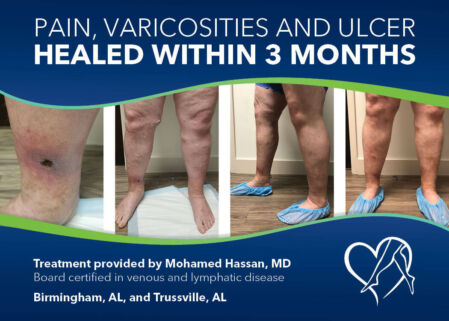
Myths and misconceptions about varicose veins are numerous—from who gets them to what causes them and whether or not they need to be treated. These myths perpetuate inaccurate information that causes many people to postpone or dismiss vein treatment, which can unnecessarily put their health at risk.
The vast majority of people do not know that venous disease can lead to limb-threatening or even life-threatening complications. Many patients will ignore their varicose veins, believing it is merely a cosmetic issue, erroneously believing that insurance plans won't cover it. Others may think it is a normal part of aging (it is not!). All of these dangerous myths need to be debunked.
Unfortunately, most patients present too late with devastating complications of venous disease, including chronic leg swelling, irreversible skin damage, blood clots, leg ulcers, or full-blown lymphedema. I do not blame them, as one of the greatest dangers of varicose veins is that they can be slow and silent. In fact, many people with this condition don’t experience any symptoms at all, even though their veins are damaged and affecting the cells and tissues around them.
Louis is a 34-year-old male in relatively good health who has never smoked or had any medical issues. He developed varicose veins at a young age but initially ignored them, thinking they were a minor cosmetic issue. He enjoys the outdoors and rides his bike to work every day. As a machinist, Louis stands for long hours on his feet to provide for his lovely wife and kids.
Over time, his legs started to become tired and achy quickly, yet he decided not to seek medical help, believing that these symptoms were normal because he worked on his feet for long hours. After a few years, he noticed some skin changes around his ankles and subsequently developed a small wound. Because Louis is young and healthy, he never brought it up to his primary doctor. Still, thanks to his caring and intuitive wife, she proactively convinced him to contact Center for Vein Restoration directly to get evaluated.
Once Louis stepped into my office, I knew he was in trouble. He had a bulging thin-walled varicose vein in his lower left thigh that was about to burst. With the help of an ultrasound, we could identify that it was internally connected and leaking into the tissue around his left ankle, creating a venous ulcer. We customized a holistic treatment plan to manage his veins and wound simultaneously. Gracefully, three months later, symptoms had subsided, and the wound was completely resolved.
Many providers would not routinely examine the legs, so it is important not to underestimate your symptoms! Bring your vein conditions to your doctor’s attention so they can take the necessary steps to evaluate your veins.
The spectrum of symptoms is somewhere between mild discomfort to swelling and heaviness in the lower extremities (frequently described as throbbing or aching). This commonly occurs toward the end of the day after the patient has been sitting or standing for a prolonged period. Severe pain of different types is not uncommon, leading to numerous empiric approaches, including narcotics.
Itching can be seen as can numerous paresthesia (a “pins and needles” feeling) and other symptoms frequently misdiagnosed as neuropathy (damage to the nerves). Nocturnal (nighttime) cramps and restless legs are also quite common in patients with venous insufficiency.
Most vein problems can be prevented, but when I ask my patients why they waited so long to see me despite suffering vein problems, the following are the most common (and incorrect!) answers I hear:
This is a surprisingly common question. Here is my answer:
If you or your loved one hasn't been to a doctor for a long time, encourage them to do so. Even if they have no specific symptoms, then just for preventive care. Remember that early detection can lead to better outcomes for many healthcare conditions.
If you are experiencing uncomfortable symptoms related to venous insufficiency, it is vital that you seek vein care from a qualified, board-certified vein specialist. Your vein doctor can evaluate your legs and, if necessary, provide vein treatment.
At Center for Vein Restoration (CVR), our providers are accredited and offer many minimally invasive treatments to correct vein conditions. These office-based procedures include Venaseal, endovenous laser ablation, ambulatory phlebectomy, radiofrequency ablation, and more. All treatments are performed in a comfortable outpatient setting and require little to no downtime. Patients can return to their normal routine immediately with few restrictions.
With over 100 vein centers nationwide, chances are there’s a CVR near you. Call 240-965-3915 or visit CVR online to locate your nearest vein clinic. Once you’ve identified your clinic location, you can schedule online 24 hours a day, seven days a week. Major insurances, including Medicare and Medicaid, are accepted.